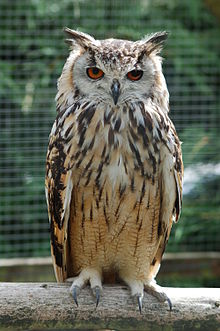Horned owl
Bubo is a genus of large owls. It includes the eagle-owls (Old World) and the horned owls (the Americas).
| Horned owls and eagle-owls Temporal range: Late Pliocene to present
| |
|---|---|

| |
| Indian eagle-owl, Bubo bengalensis | |
| Scientific classification | |
| Domain: | Eukaryota |
| Kingdom: | Animalia |
| Phylum: | Chordata |
| Class: | Aves |
| Order: | Strigiformes |
| Family: | Strigidae |
| Genus: | Bubo Duméril, 1805[1][2] |
| Species | |
|
About one or two dozen | |
| Synonyms | |
This genus contains about one or two dozen species of typical owls (family Strigidae). It is found in many parts of the world. Some of the largest living Strigiformes are in Bubo. Traditionally, only owls with ear-tufts were included here, but that is no longer the case.
Mitochondrial DNA (mtDNA) cytochrome b sequence data supports the decision to put the snowy owl, an eagle-owl adapted to Arctic conditions, into Bubo.[4]
The fish-owls in the genus Ketupa, and the Scotopelia fishing owls, are also closely related. They might be moved into Bubus, but that would make the genus rather large. As it is some of these owls, like Verreaux's eagle-owl, are not studied enough. More research is needed.[4]
References
change- ↑ Melville, RV & JDD Smith, ed. (1987). Official Lists and Indexes of Names and Works in Zoology. ICZN. p. 58.
- ↑ Gregory, SSMS (2010). "The two 'editions' of Dumeril's Zoologie analytique, and the potential confusion caused by Froriep's translation Analytische Zoologie". Zoological Bibliography. 1 (1): 6–8.
- ↑ Possibly a junior synonym of Ketupa, if that is a valid genus: Pavia (1999), Mlíkovský (2002, 2003).
- ↑ 4.0 4.1 Olsen, Jery et al 2002. A new Ninox owl from Sumba, Indonesia. Emu 102 (3): 223–231.